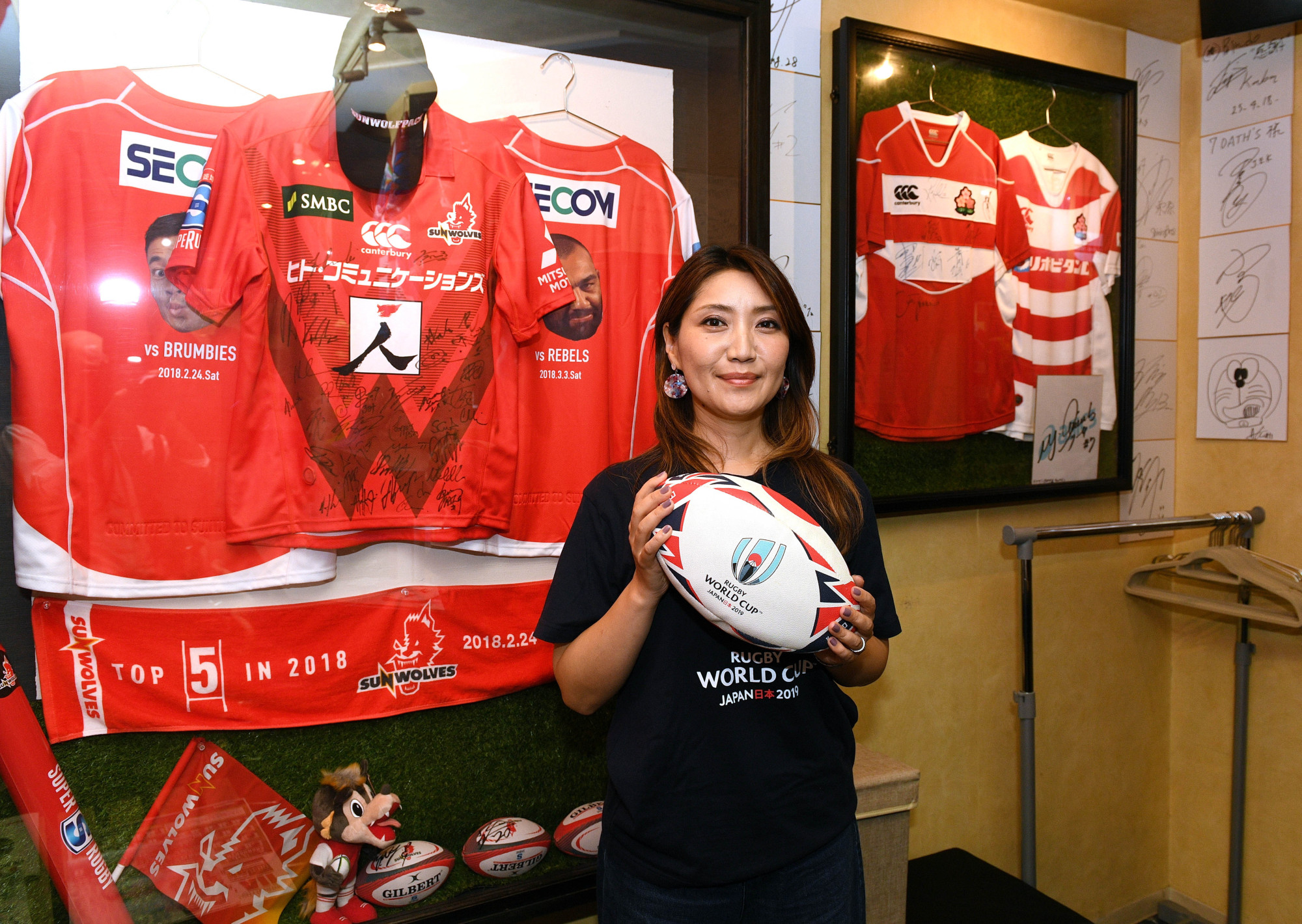Music and sports are completely different fields. There are many situations, however, where their paths cross. Often it's music and songs that help cheer up fans and teams and allow supporters to develop strong bonds with the players and each other.
Singing "Take Me Out to the Ball Game" is almost standard at Major League Baseball games. "J's Theme," meanwhile, was composed to celebrate the birth of the J. League in 1993.
The upcoming Rugby World Cup has "World in Union" as its theme song. But for Japanese rugby fans and players, there is another cheer song that is often sung during pregame ceremonies at domestic rugby games.
Pop singer Atsuko Watase composed and released "Daenzakura" in 2008. Since then, the song has been popular among rugby players and fans. Watase has also been performing the song during the pregame event at the National High School Rugby Tournament, one of the most prestigious domestic high school sports events, at Hanazono Rugby Stadium in Higashiosaka, Osaka Prefecture, since 2016.
She produced the official music video in 2015, the year the last Rugby World Cup took place. The video features Japan scrumhalf Fumiaki Tanaka as the main vocalist in addition to others players and coaches from various levels, such as kids, seniors and wheelchair rugby players. The video has been viewed more than 135,000 times on YouTube.
"A lot of people sing a phrase of the song and relay (it) to others. By using that style, I wanted as many rugby fans as possible to memorize and sing the song," Watase said about the video. "You see them passing a ball around to others. That helps create the symbolic image of the bonds of rugby lovers."
Watase never imagined she would become this deeply involved in rugby when she graduated from Musashino Academia Musicae in 1998.
Following her graduation, Watase briefly worked at an NEC Corporation-affiliated company while playing music and had chances to watch the NEC Green Rockets play.
"At first, the game was shocking as I heard the sound of people colliding all around the pitch. I didn't understand how they moved forward when they are only allowed to pass backward," Watase recalled. "I often had chances to go drinking with active or retired rugby players after games and they all told me about rugby with passion. They talked about heart-warming episodes, typical stories in rugby and so on. I gradually understood the spirit of rugby and liked the sport before I grasped the rules well."
As she fell in love with rugby, Watase met then-NEC assistant coach Shuichi Akihiro, who also worked for the Japan national team under John Kirwan from 2007 to 2011. Akihiro offered Watase the chance to write a cheer song.
"According to Akihiro, Japan always sang Kyu Sakamoto's 'Sukiyaki' as its cheer song. But Coach Kirwan wanted an original one, something of their own," Watase said. "I wanted to convey that rugby is a team sport and the players are together. I also wanted to give it a message that you achieve something if you don't give up. Dreams come true if you don't quit.
"I made this song for fans and the players to sing together and feel unified," added Watase, who has seen her vision gradually come to fruition.
The Japan national high school team defeated Under-19 Ireland 40-24 at Donnybrook Stadium in Dublin on March 28, 2018. The players sang "Daenzakura" on the field after the victory.
"I was very happy to watch that video and heard the players and coaches had made it their goal to sing the song when beating the Irish," Watase said. "More and more rugby clubs sing my song now."
"Daenzakura" is made up of two words — daen (oval) describes the shape of a rugby ball and sakura (cherry blossom) is, of course, the symbolic flower of Japan.
"You never know where the oval ball rolls," Watase said. "Rugby people say it is unpredictable, but it makes rugby more interesting. I feel the same can be said about life. My inspiration to make the song started there."
Watase was born in Haramachi, Fukushima Prefecture, in 1975. Her hometown was combined with two other towns to form Minamisoma in January of 2006. Her father, Issei, was the last mayor of Haramachi and the first of Minamisoma. He served until January of 2010.
For Watase, March 11, 2011, is unforgettable for two reasons. The first is that her hometown was severely damaged by the Great East Japan Earthquake and the ensuing tsunami. The other reason is that it was also the day she was going to have a wedding ceremony in Tokyo.
The wedding was postponed for a year and since then touring the damaged towns in Tohoku area became one of her activities as a singer. She has appeared in many charity concerts in the region. Some were organized by her father, who passed away in April.
Now, Watase is looking forward to seeing Rugby World Cup action in Kamaishi, Iwate Prefecture, another city that incurred serious damage from the natural disasters.
"There were mixed feelings while campaigning to bring World Cup matches to Kamaishi. Some said it's not the right time for such an event and others supported the movement," Watase said. "I understand both sides, but I hope it can work as a way to initiate recovery from the earthquake and also encourage other damaged areas. I want Kamaishi to succeed and become one of the good examples of the Tohoku recovery."
Yoshimune Satake contributed to this story.


















With your current subscription plan you can comment on stories. However, before writing your first comment, please create a display name in the Profile section of your subscriber account page.